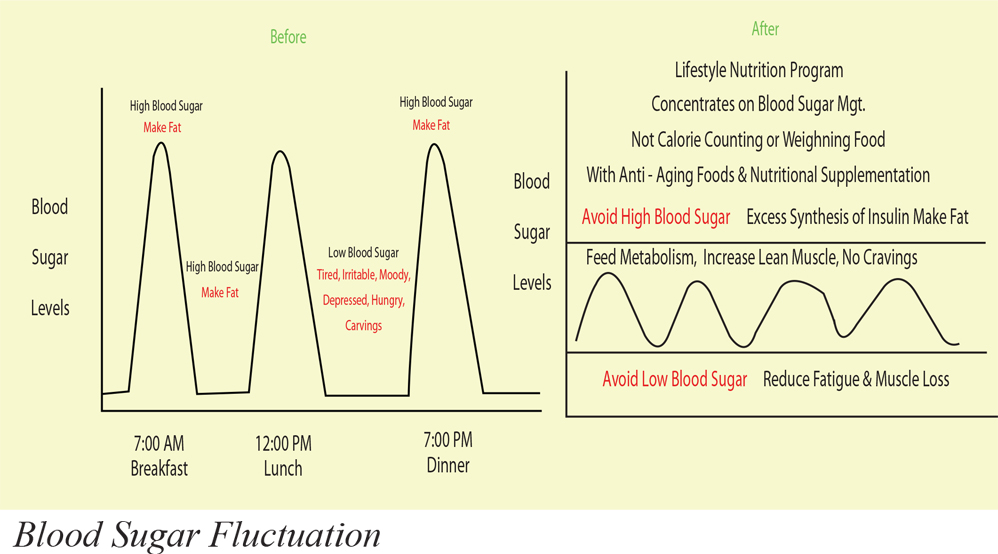Benefits to Providing a Metabolic & Behavioral Approach To Nutritional Counseling for Disease Prevention

Seasoned healthcare practitioners have graduated to advising their patients to incorporate long-term behavioral changes into their individual lifestyles rather than just providing quick fixes that inevitably cause a relapse in behaviors and consequently their weight loss. By incorporating a proprietary metabolic analyzer and software, and training a CA or designated “wellness coach,” we can customize a sliding scale of carbohydrates, proteins, and fats based on a patient’s metabolic rate, age, height, weight, lean mass, and activity level, assuring good outcomes without hunger, cravings, or fatigue
Office-based Lifestyle Nutrition Metabolic Counseling Programs with flexible software can accommodate most patients requesting nutritional programs, such as Atkins, Zone, Paleolithic, sports nutrition, chronic fatigue, gluten/dairy-free, food allergies, or a simple Mediterranean plan, for weight loss, maintenance, or even weight gain. By utilizing software and metabolic typing, it’s easier, more cost effective, and lucrative to teach a wellness coach or chiropractic assistant how to provide specific “real food” suggestions to patients on a weekly basis. A wellness coach or CA can recommend foods that can be purchased at a local grocery store and that are specific to a patient’s metabolism, lean body mass, activity level, and food preferences

According to the Center for Science in the Public Interest (CSPI), it costs an average of $1,400 to lose 20 lbs. of weight in the US. Most commercialized programs focus on expensive packaged foods, meal replacements, diet products, and supplements, and are not doctor supervised 4. With tougher economic times, many doctors report that sales of nutritional supplements and weight loss supplements have decreased. However, lifestyle management programs are more profitable for their owners because they are less costly for patients since they are not forced to purchase expensive supplements, medications, and food replacements. In addition, lifestyle management programs market well and gain the respect from peers in your community because they rely on long-term behavior modification rather than provide a temporary fix
NUTRITION
Clients are substantially more motivated and receptive to learn how to properly balance their blood sugars rather than just counting calories or dieting
Nutritional Compliance, Metabolic Profiling, and Patient Food Preferences
It is paramount for patient compliance to provide tailored sliding scale meal plans, which can change the amount of carbohydrate, fat, and protein for each patient’s metabolic profile and activity level. Using a sliding-scale meal plan based on a patient’s metabolic profile, activity level, and lean muscle mass assures that we provide adequate carbohydrate for glucose, muscle glycogen, and energy utilization, protein for muscle anabolism, and healthy fat for anti-inflammation and satiety. This approach, along with exercise, has helped decrease the least insulin resistance, hyperlipidemias, fatigue, and diabetes, as well as cardiac and cancer risk factors, which are prevalent in the US.
This approach significantly decreases hunger, appetite, and fatigue, and your patients will embrace your suggestions and look forward to learning more. Patients are substantially more motivated and receptive to learn how to balance their blood sugars properly, rather than just counting calories or dieting. We encourage patients to become more aware of the improvement in their energy levels, stamina, focus, and overall well-being, rather than just the number on the scale. By quantifying caloric expenditures based on lean muscle mass and anaerobic and aerobic calorie expenditures, you can be more effective with weight loss, insulin resistance, fatigue, and lean muscle mass increases. We teach patients to manage their blood sugarseffectively without having to count carb grams, food groups, or calories, or by providing unnecessary food restrictions
After 24 years of nutritionally counseling patients in our clinics and implementing more than 900 nutrition counseling programs with doctors nationwide, we find patients are highly motivated to learn which real foods to eat. Patients are spending $800 to $1,400 out of their pockets (credit cards) for a 12-week nutritional counseling program, which is significantly less expensive than commercialized programs. Do not let these patients slip by in your practice by not having screening tools, such as surveys, and a program that addresses how to eat whole, healthy foods that are adaptable for each patient’s background, food preferences, and lifestyle, based on metabolic, nutritional, and medical needs. By providing a program that focuses on food, you can offer a less expensive counseling program that is 40 to 50% the cost for most commercialized programs, which are not medically supervised.

By providing patients with the specific name brands of foods to incrementally and strategically to incorporate into their hectic lifestyles on a weekly or bi-monthly basis, and by spelling out in great detail what to do, patients are more receptive and achieve greater compliance than generic diet sheets, carb or fat gram counting food groups, or food pyramids, which have been commonly used in the past for nutritional counseling. Each week, a patient should leave with succinct nutritional goals, exact name brands of foods, and shopping lists with enough detail so that it is 100% clear what he or she is expected to do. Each weekly nutritional session’s goals and food recommendations should change and build upon the prior week’s set of goals. Food preferences should be individualized for clinical philosophy and patient demographic. Some of your patients may need shopping lists and foods that can be purchased at a Whole Foods or Trader Joe’s, or a Walmart or Costco
Lifestyle counseling programs based on patients eating real food are significantly less expensive, more profitable for the doctor, and market really well in today’s economic climate. Many of our seasoned doctors, who have incorporated a multitude of nutrition programs throughout the years, point out that nutrition counseling based on eating whole, healthy, natural foods and not selling patients anything really builds loyal, happy, referring patients. It is very effective for generating “word of mouth” referrals, which is both personally and professionally rewarding
 Christopher Fuzy, MS, RD, LD is the Founder of Lifestyle Nutrition Inc – LIFESTYLENUTRITIONINC.COM, has a Master’s Degree in Clinical & Sports Nutrition, has offices in Ft. Lauderdale and Boca Raton, FL.and In the past 24 years, has trained over 900 physicians nationwide with the Lifestyle Nutrition Counseling Program. For More Information or try your own nutritional program, visit LIFESTYLENUTRITIONINC.COM or call 800-699-8106 For Physicians –LIFESTYLENUTRITIONINC.COM
Christopher Fuzy, MS, RD, LD is the Founder of Lifestyle Nutrition Inc – LIFESTYLENUTRITIONINC.COM, has a Master’s Degree in Clinical & Sports Nutrition, has offices in Ft. Lauderdale and Boca Raton, FL.and In the past 24 years, has trained over 900 physicians nationwide with the Lifestyle Nutrition Counseling Program. For More Information or try your own nutritional program, visit LIFESTYLENUTRITIONINC.COM or call 800-699-8106 For Physicians –LIFESTYLENUTRITIONINC.COM
